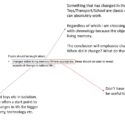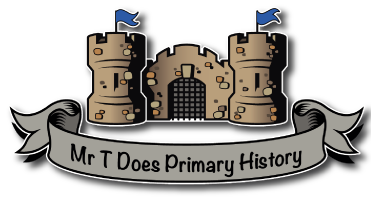Teaching Upper KS2 History – Part 2
This is part 2 of this blog series. If you haven’t read part 1, please do read it first as this both references and builds on it. Continuing to establish historical context Establishing a rich and in-depth context is not something which can be accomplished from one exposure at the start of the unit. It…
Teaching Upper KS2 History – Part 1
This half-term (Autumn two, 23) I am teaching history to my mixed Year 5/6 class in Leeds. We’re focusing on the railway revolution under the enquiry question: How did the railways benefit Britain? This focuses on the economic and societal impact brought about because of the expansion of the network including the railway revolution of…
Activities in history
I’m often asked about learning activities for various history topics and it’s something I always respond to in a similar manner, “What do you want them to learn?” Without that clear purpose as to where the activity leads the learning to, selecting the right one is somewhat harder… ok, much harder. This blog is an…
Starting to think about your next history topic?

There have been a number of teachers asking on social media about what to do for their next history topic. I thought I’d collate some ideas I tend to suggest and some choices I tend to avoid. In no way shape or form is this an attempt to denigrate those that approach history differently so…
An Introductory Guide to Leading History
This probably won’t surprise you but history is my favourite subject! I love it for so many reasons which is why I do this for a living. It’s why I love(d) leading it across a number of schools; why I’ll always be a passionate advocate for it being so much more than just an agreed…
Teaching Chronology
As you may or may not know, I’m quite nerdy about timelines! This is the third piece on chronology that I’ve produced so do take a look at the others because they cover different ground to this one. Displaying a timeline in your classroom would seem to have some obvious benefits such as exposing children…

- Become a Member
- Discount Codes
- Understanding the National Curriculum
- Leading Primary History
- CPD Quick Vids
- Termly Network
- Supporting SEND and EAL Learners
- A Guide to Closing the Curriculum Chasm between Primary and Secondary
- Chronology
- Significant Dates
- The Enquiry Approach
- Disciplinary Concepts
- Planning History Effectively
- Connecting The Curriculum
- Local History
- An Introduction to Local History
- Using a Local Site to tell a Wider Story
- Introducing Local History as a Golden Thread: Early Years and Key Stage 1
- Introducing Local History as a Golden Thread: Key Stage 2
- Ingleby Mill Primary School, Stockton-on-Tees
- Rawdon St Peter’s Church of England Primary School, Leeds
- Wider Curriculum
- Vocabulary
- Adding Diversity into Primary History